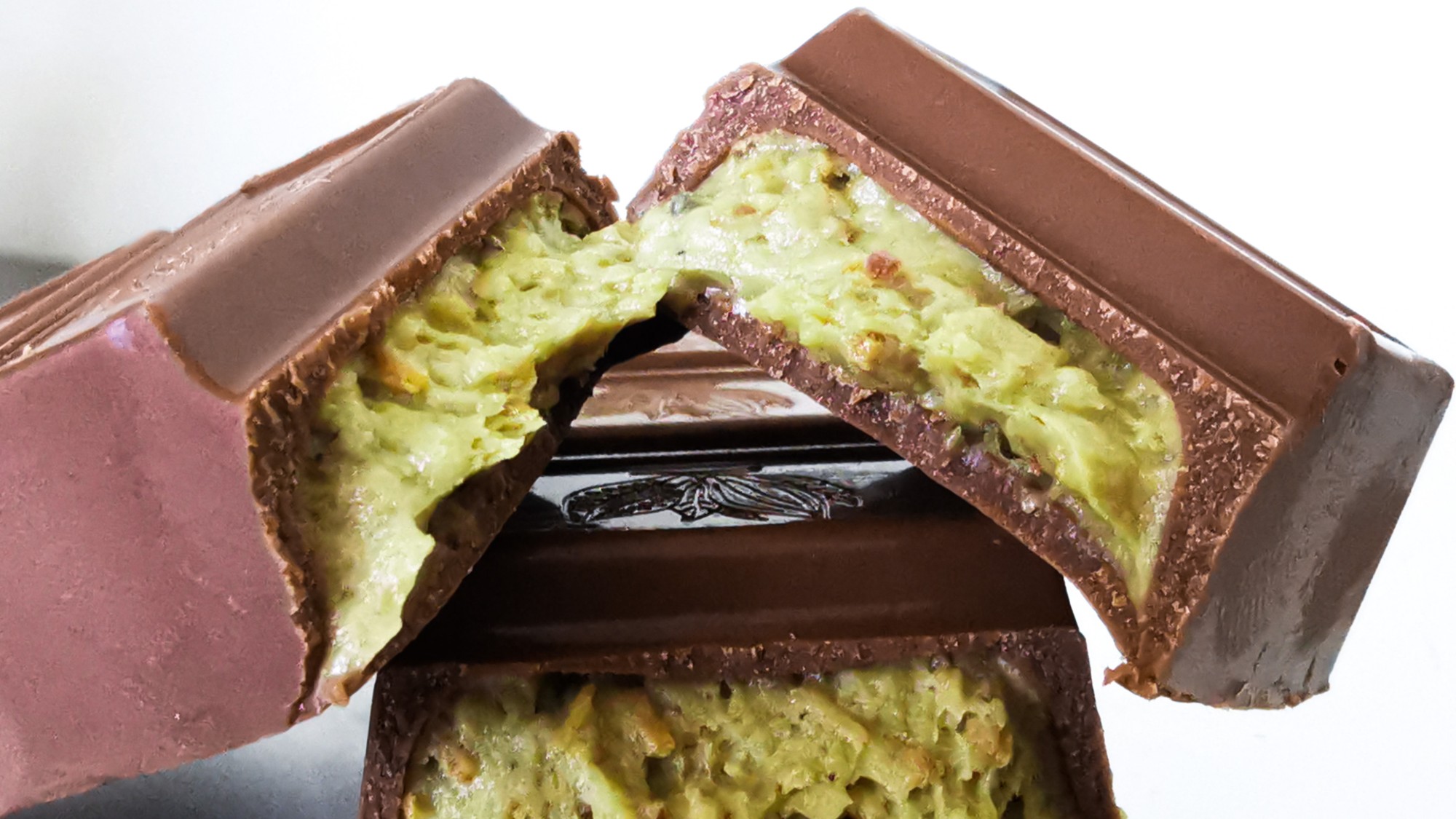The bougie foods causing international shortages
Pistachios join avocados and matcha on the list of social media-driven crazes that put strain on supply chains and environment

A free daily email with the biggest news stories of the day – and the best features from TheWeek.com
You are now subscribed
Your newsletter sign-up was successful
"The meteoric rise of Dubai chocolate has triggered a global pistachio supply crunch," said the Financial Times.
The luxury chocolate stuffed with pistachio cream was a "modest hit" when Emirati chocolatier FIX launched it in 2021. But a video posted on TikTok in December 2023 – now viewed more than 120 million times – turned it into a "global sensation".
The "worldwide craze" has predictably led to a "worldwide shortage", sending the price of pistachio kernels soaring from $7.65 a pound a year ago to about $10.30, said Giles Hacking of nut trader CG Hacking. "The pistachio world is basically tapped out at the moment."
The Week
Escape your echo chamber. Get the facts behind the news, plus analysis from multiple perspectives.

Sign up for The Week's Free Newsletters
From our morning news briefing to a weekly Good News Newsletter, get the best of The Week delivered directly to your inbox.
From our morning news briefing to a weekly Good News Newsletter, get the best of The Week delivered directly to your inbox.
'Affordable luxury'
Pistachios have "long polarised the world's taste buds", said The Guardian. In 2008, the US surpassed Iran (where the nut is native) to become the world's top exporter.
Pistachio trees are "drought-resistant"; their deep roots can withstand a limited water supply. As the climate crisis intensifies, investment in crops that don't need much water, particularly in drought-plagued California, caused pistachios to "flood the market, turning the luxury nut into an accessible flavour for everything from coffee syrups to shower gel". In 2023, pistachios were named "nut of the year".
Pistachios have since "shifted from a niche ingredient to a mainstream one", said The Times. "It's an affordable luxury," said Lizzie Haywood, innovations manager for Waitrose (which was forced to limit sales of Lindt's version of Dubai chocolate to two bars per person after multiple sell-outs). But – crucially for social media – the ingredient elevates a dish visually. "It's colourful. That green colour – people like that."
The viral trend is having an impact on the agricultural sectors of both Iran and the US. The pistachio market was "already struggling" due to last year's "disappointing harvest" in the US, said the Daily Mail. California's pistachio supply fell by up to 20% in the 12 months to February. In the six months to March, Iran exported 40% more pistachios to the UAE than in the whole year prior, according to its customs office. Now, there is a "global shortage".
A free daily email with the biggest news stories of the day – and the best features from TheWeek.com
'This is why we can't have nice things'
Pistachios aren't the only example that "epitomises the notion of 'this is why we can’t have nice things'", said The Independent.
"Sticking with the green theme", in 2015 avocados became "the go-to brunch item", leading to soaring demand in Europe and the US, and a shortage that prompted a "crime wave of mass thefts".
Another "bougie consumable" is matcha, powdered green tea used in traditional Japanese tea ceremonies. "Spurred on" by social media posts "championing matcha-infused everything", production "nearly tripled to meet demand" between 2010 and 2023. Its "fashionable status" caused a global shortage and surging prices. The small Japanese town of Uji, which specialises in matcha production, was "ill-equipped for this sudden Western clamouring". It's come under "massive strain".
Avocados are also "increasingly controversial" due to the strain they put on the planet, said environmental researcher Thomas Davies on The Conversation. Most plantations "rely heavily on fertiliser and fossil fuels", and due to their small crop yield, avocados also have a "higher carbon footprint per kilogram": more than twice that of bananas. The trees are "very thirsty" and they are grown in "already water-stressed" regions like Mexico. New plantations are also "driving deforestation", and have been linked to "organised crime and human rights abuses".
"In the face of such evidence, it's hard to argue that our bougie taste in snacks isn't destroying the planet," said The Independent. Demand dictates supply, but supply chains "simply aren't set up" for viral videos or "the overnight stardom that comes courtesy of an algorithmic quirk".
"However good the latest food and drink craze looks on your feed, it’s masking the ugly truth beneath: virality and sustainability simply aren't compatible."
Harriet Marsden is a senior staff writer and podcast panellist for The Week, covering world news and writing the weekly Global Digest newsletter. Before joining the site in 2023, she was a freelance journalist for seven years, working for The Guardian, The Times and The Independent among others, and regularly appearing on radio shows. In 2021, she was awarded the “journalist-at-large” fellowship by the Local Trust charity, and spent a year travelling independently to some of England’s most deprived areas to write about community activism. She has a master’s in international journalism from City University, and has also worked in Bolivia, Colombia and Spain.
-
 The Week Unwrapped: Do the Freemasons have too much sway in the police force?
The Week Unwrapped: Do the Freemasons have too much sway in the police force?Podcast Plus, what does the growing popularity of prediction markets mean for the future? And why are UK film and TV workers struggling?
-
 Properties of the week: pretty thatched cottages
Properties of the week: pretty thatched cottagesThe Week Recommends Featuring homes in West Sussex, Dorset and Suffolk
-
 The week’s best photos
The week’s best photosIn Pictures An explosive meal, a carnival of joy, and more
-
 Microdramas are booming
Microdramas are boomingUnder the radar Scroll to watch a whole movie
-
 Admin night: the TikTok trend turning paperwork into a party
Admin night: the TikTok trend turning paperwork into a partyThe Explainer Grab your friends and make a night of tackling the most boring tasks
-
 The best dark romance books to gingerly embrace right now
The best dark romance books to gingerly embrace right nowThe Week Recommends Steamy romances with a dark twist are gaining popularity with readers
-
 7 hotels known for impeccable service
7 hotels known for impeccable serviceThe Week Recommends Your wish is their command
-
 Is a social media ban for teens the answer?
Is a social media ban for teens the answer?Talking Point Australia is leading the charge in banning social media for people under 16 — but there is lingering doubt as to the efficacy of such laws
-
 How Utah became a media focal point
How Utah became a media focal pointIn Depth In producing the stars of #MomTok and reality TV alike, Utah has emerged as a media powerhouse
-
 The 8 best drama movies of 2025
The 8 best drama movies of 2025the week recommends Nuclear war, dictatorship and the summer of 2020 highlight the most important and memorable films of 2025
-
 More than a zipper: Young Black men embrace the ‘quarter-zip movement’
More than a zipper: Young Black men embrace the ‘quarter-zip movement’The Explainer More than a zipper: Young Black men embrace the ‘quarter-zip movement‘